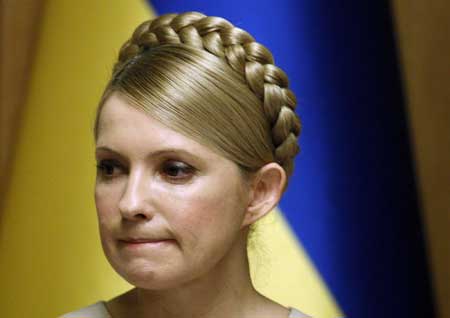Ukraine turmoil as Tymoshenko clings on as PM
Ukraine's Yulia Tymoshenko on Thursday defiantly refused to concede defeat to rival Viktor Yanukovich in a presidential election, throwing Ukraine into turmoil that threatened chances of a swift return to stability.
 |
|
Ukraine's Prime Minister and presidential candidate Yulia Tymoshenko chairs a cabinet meeting in Kiev February 11, 2010. Tymoshenko, refusing to concede defeat in a presidential election, attacked rival Viktor Yanukovich on Thursday and top aide said her government had no intention of resigning. [Photo/Agencies] |
Ending a bizarre three-day silence, the fiery prime minister -- chairing a cabinet meeting in her trademark peasant braid -- attacked Yanukovich and his Regions Party for using social spending promises as "pre-election PR".
First deputy and close aide Oleksander Turchynov told reporters Tymoshenko had no intention of bowing to a call by opposition leader Yanukovich for her to step down.
"The government does not plan to resign voluntarily," Turchynov told reporters. "I don't see any basis for this (resignation)," he said.
Western congratulations for Yanukovich began trickling in, but Tymoshenko's defiant performance appeared to herald a protracted stand-off between the rivals for power who fought a bitter campaign of smears and insults leading up to the February 7 run-off which Yanukovich won by 3.48 percentage points.
Supporters of Yanukovich, a 59-year-old ex-mechanic who wants to improve ties with Moscow, can now try to force her out through a parliamentary vote of no-confidence.
But Tymoshenko, co-architect of the pro-Western Orange Revolution of 2004, would still stay on as acting prime minister until a new parliamentary coalition was formed -- itself a lengthy process of horse-trading over government posts.
Tymoshenko's team has alleged "cynical fraud" by the Yanukovich camp, and is forcing a vote recount in some regions.
But monitors hailed the election as fair, and French President Nicolas Sarkozy became the first EU leader to call Yanukovich's win a "victory for Ukrainian democracy".
"... the Ukrainian people has expressed its choice in the course of free, pluralist and democratic elections," he said in a statement.
The stand-off in the ex-Soviet republic of 46 million people threatens further instability, deterring investors and dimming prospects for a recovery for the sickly economy.
Parliament deputy speaker Mykola Tomenko, a member of Tymoshenko's bloc, challenged Yanukovich to find the votes in parliament to dismiss the government.
"As soon as a new ... coalition is formed, I'm sure the Tymoshenko bloc will the same day declare itself a Ukrainian, European opposition force and will continue to defend those values in parliament," he said.
ECONOMIC WOES
Yanukovich, who would normally expect to be sworn in as president by March 17, will have to call snap elections if he could not form a new coalition -- but his Regions Party would likely then lose ground leaving him in an even weaker position.
"The main result of these elections is that Yanukovich came first, but did not win. Tymoshenko, on the other hand, lost but was not defeated," Ukrainska Pravda commentator Vadym Karasov wrote.
Most analysts said the likely final outcome seemed to be Tymoshenko entering opposition to fight Yanukovich whose position as president may end up as weak as that of his pro-Western predecessor, Viktor Yushchenko.
Yushchenko presided over a sharp deterioration in relations with Russia, the source of the gas that flows through Ukraine to the West. The Kremlin said on Thursday President Dmitry Medvedev had congratulated Yanukovich, and expected an improvement in ties with the departure of Yushchenko.
"We do not see any problems and very much hope that our relations will be better than they were under Yushchenko," a spokeswoman told reporters in the Siberian city of Tomsk.
The turmoil threatens to delay the resumption of IMF lending under a $16.4 billion bail-out programme. This was crucial last year for the state's finances but was suspended because of breached Ukrainian promises of fiscal restraint.
"In order to resume economic growth, we have to renew cooperation with the IMF but the Fund has a very simple position, they say 'bring us the letter which has the signature of a fully empowered, fully authoritative president, prime minister and central bank," said political analyst Yuri Ruban.
Ukraine's $120 billion economy has been battered by a decline in the value of vital steel and chemicals exports that has hammered the hryvnia currency, slashed budget revenues and undermined the domestic banking system.
 0
0 







Go to Forum >>0 Comments